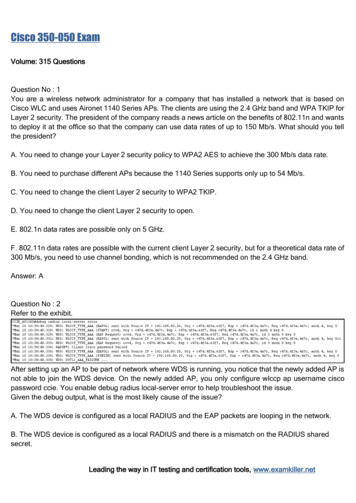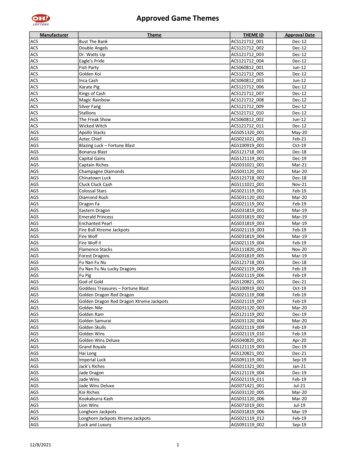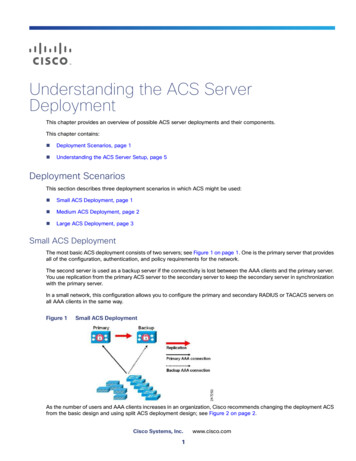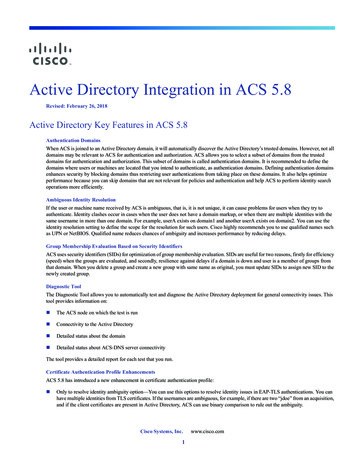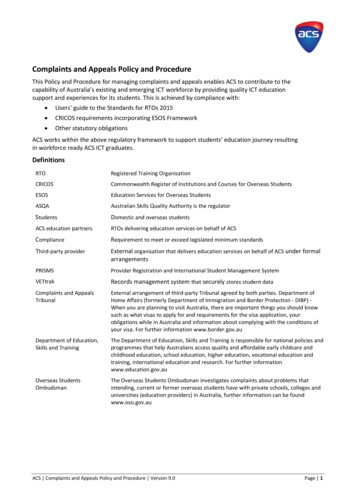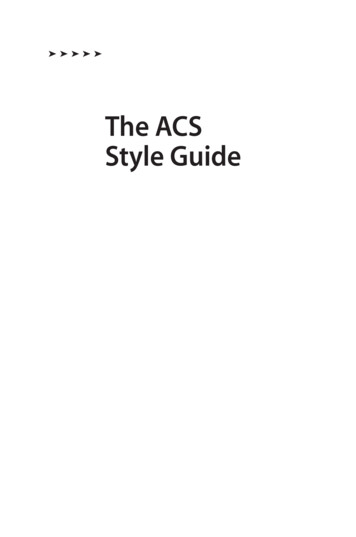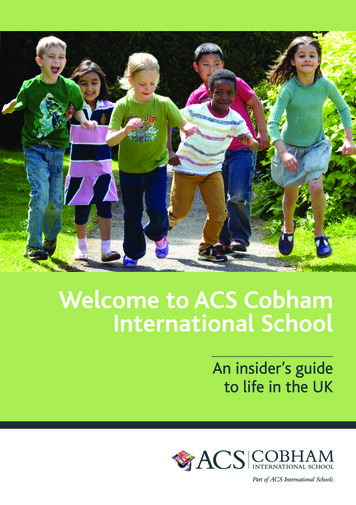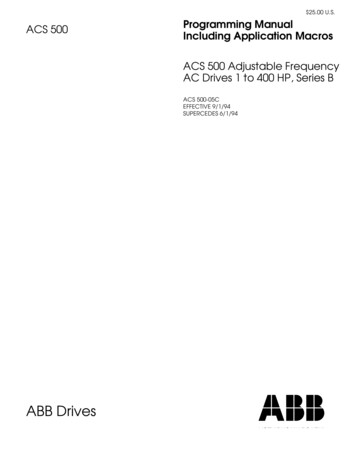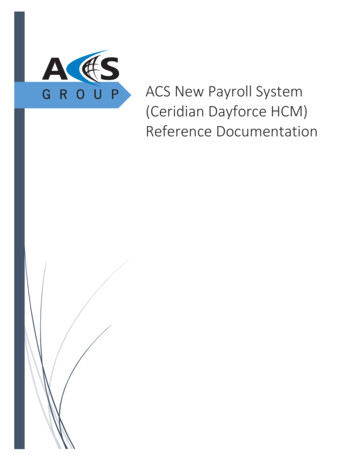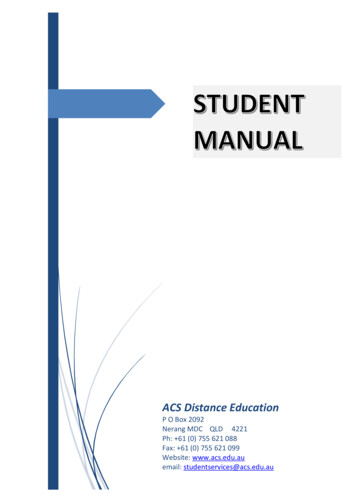
Transcription
ACS Distance EducationP O Box 2092Nerang MDC QLD 4221Ph: 61 (0) 755 621 088Fax: 61 (0) 755 621 099Website: www.acs.edu.auemail: studentservices@acs.edu.au
TABLE OF CONTENTSINTRODUCTIONHistory of ACS . 1Affiliations and Memberships .2Philosophy of ACS . . 3Levels of Study Available . 4COURSE REGULATIONSEntry Requirements . .5Learning Methods .6Qualifications Awarded Upon Course Completion . . .7R.P.L. – Recognition of Prior Learning . . . . .8Course Duration . .8Fees Policy . . .9Withdrawal, Extension and Deferments .10Refund Cancellation Policy . . .11ASSIGNMENTSStudy Guide . 12Assignments. . . .14Assignment Cover Sheet . .16How to Answer Questions . .17Direct Contact with Student Services and Academic Officers 19Feedback from your Academic Officer . . . 20Posted Assignments . 21Non-receipt of Assignments . . . .21Undeliverable Marked Assignments . . . .21Online Student Room . . . .22How to Submit your Assignment 23Re-sizing of Assignment Images . . .26Special Circumstances . . . .29EXAMSExam Procedures .30General information on Exams . 31Marking of Exams . .32Exam Application Form – Australian Students 34Exam Application Form – Overseas Students .34Sample Exam .36OTHERPersonal Conduct 39Code of Practice .41Student Support Services . .43Details contained within this manual are subject to change without notice – 13th October, 2015
Welcome to ACS Distance EducationHistory of ACSSmall beginnings and rapid growthACS began as the Australian Horticultural Correspondence School, founded by John Mason, in August1979 in Melbourne, Australia. Initially the school offered one course (Horticulture I) but within a yearhad expanded to five horticulture courses, being studied by more than 100 students across Australia.By the early 1980’s the school had an annual intake of several hundred students, had expanded itsrange of courses to include fitness, writing, photography and business in addition to horticulture, andwas offering certificate courses. Consequently, the school’s name was changed to ACS DistanceEducation to reflect our diverse range of courses and our greatly increased student numbers.Since then, globalisation and the internet have created a huge surge of students enrolling with ACSfrom outside Australia. In 1989, a South African Correspondence School (Home Study College) waslicensed to operate ACS courses in that country and in 1991 a second office was established inQueensland. Today, the school has staff in Victoria, NSW, Queensland and the UK.In 1992, following changes to the Australian Vocational Education system, the school was amongst thefirst colleges to attain formal recognition from government accreditation authorities in Australia. Thiswas followed by formal accreditation of around 70% of the school’s courses. When the AustralianGovernment accreditation system changed in the late 1990’s, it became less relevant to distanceeducation and to the international clientele of our school.Consequently, the school decided to reduce involvement with government accreditation and toconcentrate more effort on industry and global recognition. It was felt that this would serve studentsfar better than involvement with an increasingly bureaucratic government accreditation system.In 2001, web sites were established in the U.K. and America as the first step towards a real presencein other parts of the world. In 2002, the Victorian office was closed allowing ACS to centralise theservices on offer. A larger, more efficient administration and academic department was set upenabling ACS to better service our students on a global scale.A new school has now been incorporated in the UK and operates in that country as ACS DistanceEducation Ltd. ACS Distance Education and ACS Distance Education Ltd. are two separate entities,however these two schools do maintain an affiliation, and in some instances sub contract servicesfrom each other.Branching into Publishing and Garden showsIn the 1980’s, ACS developed its involvement with industry and this has become an important branchof the school’s activities. In 1986, the school began writing articles and magazines for ExpressPublications. Since then, staff have been contracted to produce all the writing and photography formore than 100 complete magazines. From 1988 to 1992 the school organised major Garden1
Exhibitions as part of the Royal Agricultural Society’s Royal Melbourne Show. For two years, the schoolwon best exhibit awards.ACS in Australia and the UKACS Distance Education is a Limited company incorporated in England and Wales. ACS DistanceEducation Ltd is licensed to operate all courses owned by ACS Distance Education. Mr. Mason andother staff have travelled widely in order to maintain a current appreciation of trends anddevelopments. Mr. Mason’s books and videos are sold worldwide.AFFILIATIONS AND MEMBERSHIPSBoth ACS Distance Education in Australia and ACS Distance Education in the United Kingdom arerecognised by the International Accreditation and Recognition Council (IARC) - a self-regulatingindustry body of colleges and universities from a number of countries. Certificates and Diplomasoffered are accredited through IARC. For details see www.iarcedu.comACS Distance Education has a variety of relationships with other organisations, including: Institute of Certified Bookkeepers – ACS (Australia) is an accredited training centre Institute of Horticulture (UK) Career Advisory Board Royal Horticultural Society (UK) – ACS supplies courses for RHS qualifications. These Qualificationsare awarded by the RHS after successful completion of RHS administered examinations. Thesequalifications are accredited through the Qualifications Curriculum Authority (UK) Complementary Medicine Association (UK) - College Member of Complementary MedicineAssociation - assessed to teach a range of areas including Counselling, Nutrition, Natural Therapies Organisational Member of the Association of Life Coaching (OMAC) – (UK) Membership of - Nursery & Garden Industry Association of AustraliaInternational Herb AssociationAustralian Institute of HorticulturePermaculture Association (UK)British Institute for Learning and DevelopmentGold Coast Education Network (Foundation Member)Study Gold CoastInstitute of Horticulture (UK)Alternative Technology Association (Aust)Parks & Leisure (Aust)We are affiliated with over 15 other colleges (mainly in Australia and the UK) many of whom holdvarious government recognitions and other accreditations.Courses offered by these institutions are developed by ACS Distance Education but are not necessarilyidentical to those provided by ACS.Information on these affiliated colleges can be found aspxMany courses are formally articulated with Warnborough College (UK & Ireland).2
PHILOSOPHY OF ACSStudents are our priority. Our policies and procedures are aimed at providing each student with thebest possible education available at their chosen level. We make every attempt to assist studentsquickly and appropriately so they can successfully pursue their studies and achieve their goals.ACS believes that good education develops a foundation for future success. Our courses preparegraduates to face any challenge that confronts them in the discipline for which they have been trained.We believe in providing a balanced education through development of knowledge, understanding andskills. A balanced education does more than provide information. It provides students with the abilityto select and use information effectively in any situation. It increases students' awareness of thechanges occurring locally and globally in their chosen field, and nurtures their ability to adapt.ACS achieves its goal of balanced education by focusing on content and delivery rather thanassessment, by teaching for maximum learning and retention, and by maintaining a global focus.In our experience, students frequently place more importance on a qualification than employers orclients do. Increasingly, the movers and shakers of today’s world are more interested in what you cando, and what you can contribute. Therefore, our focus at ACS is on what we teach, and how we teachit. We take a flexible approach to assessment that can be readily adapted to the needs of eachstudent.Our teaching methods encourage students to not only understand the course material, but to retainit in their long term memories. To enhance students’ ability to remember and apply what they learn(the key to becoming an expert), we use repetition, presenting the information several times indifferent ways. Assignments and tasks encourage students to reflect upon the material from differentperspectives. This helps to reinforce and clarify concepts, and to improve retention. It also preparesstudents to use their knowledge flexibly and creatively within a rapidly changing world.ACS knows that in today’s world it is not enough to understand and know how to do something. Youmust also be able to adapt your knowledge to different situations. For this reason, ACS believes thatgraduates need to be flexible and have a heightened awareness of changes occurring around them,especially in their chosen fields. When you are aware of what is happening, and understand the world,you can apply your knowledge and understanding to develop innovative solutions. Our coursesencourage students to attend to what is happening in their field and around them.ACS’ global focus is also reflected in the flexible nature of our courses and our teaching. More thanmost courses, ACS courses have been written to meet the needs of a highly mobile global population.Educated people of the 21st century move about more than ever, and even at home, they are muchmore likely than in the past to be dealing with people from other countries or cultures. The modernbusiness person needs to be innovative, lateral thinking, flexible, and able to work independently.A good international school is able to adapt its courses to the different cultural, geographical,economic or social needs of its diverse clientele. ACS’ uniquely flexible approach and emphasis onstudent learning ensures that our courses can be modified to meet the needs of each student withoutsacrificing quality.3
Flexible learning and assessment provide more opportunity for development, and allows students tolearn at their own pace and in ways that are best suited to their learning styles, interests, goals andneeds. It also provides more value for money by allowing us to tailor courses to student goals and toeliminate unnecessary paperwork and Academic Officering.LEVELS OF STUDY AVAILABLEACS provides education and information services through a variety of methods including: Online trainingE-Learning - CD-ROMCorrespondence – printed paper-based notesElectronic Publishing (ebooks)ACS BookshopHobby & Adult EducationStudy that is undertaken by adults, primarily for general interest or self-improvement.Vocational EducationEnables students to gain knowledge and skills which prepares them for careers at various levels.Higher Academic StudiesThis refers to study undertaken at a higher level than vocational, which are academically challenging,developing not only a student’s knowledge of a subject, but exercising the student’s ability to thinkmore deeply about the subject. Higher academic studies will develop the student’s depth of thought,and capacity to be innovative and creative in applying their knowledge to real life problems.4
ENTRY REQUIREMENTSGenerally, no prerequisites apply if you are studying an individual module or short course forself-interest and do not intend using that course as a credit towards a qualification.It is normally assumed that the student has an education at least comparable with year 10secondary school-level; that they are English literate and that they have adequate selfconfidence and motivation to make a reasonable attempt at completing assignments.Exceptions can be made for younger students if there is demonstrated ability to undertakestudies (this would need to be determined on a case-by-case basis).Proficiency AwardsA certificate or higher qualification of 200 hrs duration or more; or at least 2 years ofrelevant work experience; or over 21 years of age.CertificatesYear 10 or 1 year of full-time work following Year 9; or over 21 years of age.Advanced CertificatesYear 11, or 1 year of full-time work following Year 10, or a vocational Certificate (of600 hrs); or over 21 years of age.DiplomasYear 12 or a vocational certificate (comprising 600 hours course work); or over 21years of age.5
LEARNING METHODSOnlineOnline courses are conducted through our online learning site, www.acseduonline.com. Youcan access all course materials through this website, and also complete interactive Self Teststo enhance your understanding of ideas or identify potential weak areas in your knowledge.Assignment submission is through the online Student Room. Course material is in PDFformat; course notes can therefore be printed or saved to your computer. ACS interactiveonline courses are truly unique, allowing not only for online submission and return ofassignment, but also allowing for effective, relevant teacher-student communication andinteractive course delivery.E-LearningSimilar to online courses, except all course materials and interactive Self Tests are mailed toyou on a CD-ROM instead of accessed on the internet. Assignment submission is through theonline Student Room.CorrespondenceThis is the traditional method of completing home study courses at ACS Distance Educationthrough printed paper-based notes. All course materials are posted to you. Assignmentsubmissions can be posted or submitted via the online Student Room. You can, of course, stille-mail or telephone us at any time for assistance regarding your course.6
QUALIFICATIONS AWARDED UPON COURSECOMPLETIONLetter of CompletionA Letter of Completion is given to students who have successfully completed all assignments in a shortcourse, but who have elected not to sit the optional exam. The Letter of Completion is not awardedautomatically – you need to request it by emailing studentservices@acs.edu.auStatement of AttainmentA Statement of Attainment is awarded to students who have successfully completed all assignments andthe exam in a short course. They are also awarded upon completion of each module within higherqualifications such as Certificates and Diplomas.Certificate and Higher QualificationsCertificates, Proficiency Awards, Diplomas etc. are awarded upon successful completion of the respectivecourse – this includes all exams, assignments, research projects, work experience, etc. As a graduate,you are entitled to use the appropriate abbreviation of your qualification after your name.*** Please note that exams are optional for students studying a single module of study only.*** Exams are compulsory for Certificate and Higher qualifications. Exam fees apply – see page 30 - 36for details on exams and application.7
RPL – RECOGNITION OF PRIOR LEARNINGRecognition of prior learning simply means that you are considered to have already advanced in orcompleted some of your course before you begin. In effect this relates to any method by which you maybe exempt from studying parts of a course.Recognition of Prior Learning (RPL) applications should be made prior to enrolling in a course and mayonly be granted by academic staff.Also known as advance standing, it is not commonly granted for any more than one third of a formalqualification. In exceptional situations, where both industry experience and formal studies areoutstanding, advance standing of up to but never more than 66% may be granted.Granting creditWhen advance standing is granted on the basis of passes achieved in other courses at this or anotherinstitution, the advance standing is referred to as “granted credit”. Credit may be granted on the basis ofsighting and signing off transcripts from prior courses.Recognition of prior learningWhen your application for credit is granted on the basis of both prior studies and work experience, it isreferred to as “recognition of prior learning (RPL). RPL must be granted on the basis of a formalsubmission on standard RPL documents, together with collaborating documentary evidence (e.g.resume, copies of previous exam results, an outline of courses previously studied, etc). An RPL applicationform and more information can be found at: rpl.aspxCOURSE DURATIONShort Courses (100 hours duration) should be completed within 12 months of enrolment.Certificates, Advanced Certificates and Diplomas (over 600 hours duration), should normally becompleted within 3-5 years of enrolment.Studies are self-paced. Should you require longer than the set timeframe, you can continue with yourstudies, however a restart fee may be charged.8
FEES POLICYUp-front paymentYou may choose to pay full fees on enrolment. This is the least expensive option.Payment PlansIf you choose to pay for a course using a payment plan rather than full fees on enrolment, the overall cost ofyour course will be greater. However, since ACS is committed to keeping costs to a minimum withoutsacrificing quality, the overall cost is still very competitive, regardless of your payment plan option.For individual modules, your payment may be split into two parts. If you have chosen this option, your firstpayment will have already been paid on enrolment. The second payment will be due 60 days after your dateof enrolment. The second instalment needs to be paid regardless of whether you continue with your courseor not.If you have enrolled in a certificate or higher qualification, further payment plans are available with thecourse being split into various stages. The first payment will cover a proportion of your course. Subsequentpayments will be due at various stages depending on which payment option you choose.9
WITHDRAWAL, EXTENSION ANDDEFERMENTSWithdrawal in Extraordinary SituationsWhen a withdrawal is requested due to extraordinary circumstances, including death or serious illnessaffecting the student or an immediate relative, the application will be considered on its merits. Theapplicant must submit the following in writing:a. A detailed account of the extraordinary circumstancesb. A medical certificate or legal document to verify the extraordinary circumstancesc. A written request for cancellation of the enrolmentIn such cases, a response will be dispatched in writing within one month of receipt of the completewritten submission (containing the three items above)If approved, all course materials will need to be returned. Then any monetary refund will exclude a chargemade for any of the following:-administration and postage costs already incurredassignments already marked (if applicable)support services provided over the telephone, email, or in any other way, which have alreadybeen accessedRefusal of application for withdrawalWithdrawal applications will not be considered in cases where the course has been paid for by anorganisation or individual other than the person enrolled; unless the application is supported in writingby the person or authority that funded the course.These withdrawal applications must be received on an official business letterhead and the signatory ofthe organisation must be available to confirm the application if approached.Extensions and DefermentsAny student requesting an extension or deferment for the first time is granted 6 months, if their recordsshow they have been making some reasonable effort and progress in their studies. No fees apply in this case.Further deferments or extensions may be granted at 6-month intervals. Please note that studies can bedeferred or extended indefinitely, however restart fees may apply.10
REFUND CANCELLATION POLICYUpon enrolling in a course with any school, a student is entering a legal agreement under common law, in which theyagree to abide by the conditions of enrolment (including meeting stated payments), in exchange for the service offeredby the institution in the delivery of the course.Please note, ACS cannot be held liable for changes in your circumstances.In a situation where a student wishes to cancel or change their enrolment and as a measure of goodwill, ACSDistance Education will allow the following options:1. For a period of 14 days from enrolment - a refund (less minimum 100 administration fee per module, plus postageand handling costs if already incurred –which may vary depending on the course package and where you are located)will be given if the student notifies the schools administration department in writing. For this to apply, a letter mustbe received within the 14 day period, either by fax, email, ordinary mail or delivered in person. The onus is on thestudent to ensure and confirm that written notification of withdrawal is lodged and received. The school will not beresponsible for messages going astray.Note: If course notes have already been sent to the student - they must be returned before the refund is paid.2. For a period of 30 days following receipt of the material a student may apply for special consideration to swaptheir course for another course. The application for special consideration must be made in writing (not by telephone) and must explain whythe student wants to change the enrolment.These options only apply if the student has not yet submitted any assignmentsAn administration fee of 100 will apply in these circumstancesThe school will provide credit for monies paid for the original enrolment, against the new enrolment (i.e.new course or person), but will not give any monetary refund or credit against other purchases.Following written notification by the school of acceptance, the old course notes must be returned to theschool within 1 week (2 weeks for overseas students) for it to be valid.3. For a period up to 2 months following receipt of the material, a student may apply to transfer their enrolment to afriend, relative or colleague who agrees to take over the enrolment. An application for special consideration must be made in writing (not by telephone), and be accompaniedby a letter of explanation.This application only applies if the student has not yet submitted any assignmentsAn administration fee of 150 (plus postage and handling costs) will apply in these circumstances.The school will provide credit for monies paid for the original enrolment, against the new enrolment (i.e.new course or person), but will not give any monetary refund or credit against purchases other thancourses.4. At any time during enrolment the student may apply to defer their studies for a 6-month period. Such an applicationmust be supported in writing by documentation that explains why they cannot continue their studies for a period oftime (eg. a letter of explanation). Recommencement fees may apply, please contact the school for more details.A student may only take up one of these options once. Please read the above options and apply in writing to theAdministration Manager11
STUDY GUIDEDistance education with ACS is different to many other forms of education, and even to distanceeducation through other institutions.Common misconceptions about distance educationStudents commonly enter distance education with preconceived concepts about how the system mightwork, based on their experience with “correspondence courses”.Assignments are frequently seen as something that MUST be passed. Therefore, students sometimeshesitate to submit an assignment for fear that they might not pass.Assignments are an important part of the overall process of interaction between you and the school.They help the Academic Officer evaluate what you do and do not comprehend, and respondappropriately. It does not matter if you get things wrong in an assignment, for this simply allows theAcademic Officer to understand your weaknesses better, and help you overcome them. Do not be afraidto make mistakes! You can learn from them. Trying to hide a mistake from your Academic Officer, orgiving answers that you have obtained from others (including other people in the school) can misleadyour Academic Officer into incorrectly evaluating your understanding and thought patterns. Unless yourAcademic Officer knows where you need extra assistance or support, you will not receive the assistanceyou need or deserve.Students often equate the value of a course with the quantity of reading they are assigned.A modern distance education course is much more than a collection of readings. Books can providefactual information, but if you want to gain a foundation understanding of a discipline which can beremembered and built upon, take a course. A good course provides much more than the mostinformative book.Managing TimeLiterature from the school provides an indication of the hours required to complete a course. For mostpeople, it is possible to complete a 100 hour module (short course) in 100 hours. Examinations andpreparation for exams may take more time.Students may take longer to get through the work if they are slow at reading or writing, or are living inan isolated area where they need to travel greater distances to visit facilities related to their study (eg.In a horticulture course, one student may need to travel further than another to visit gardens andnurseries). Students who want to get the utmost from their studies and put in a great deal of extra effortmay find a 100 hour course taking them a great deal more than 100 hours to complete. On the otherhand, students who read fast, and retain information easily (eg. have a photographic memory) and havefacilities on hand that relate to their course (such as work in a relevant industry) may completeassignments faster and more easily. However, for most students, the 100 hours quoted is an achievablefigure if time is well managed. If you do not manage your time, you may find yourself spending a greatdeal longer than expected in order to complete your course. In the case of a longer course such as acertificate or diploma, the time spent on study can become excessive if time is not well managed.12
Some points to remember for optimal learning Set yourself very clear goals, such as completing an assignment every week, and stick to thosegoals.Limit the amount of time you spend undertaking some tasks, even though you are not alwayscompletely happy with the results. If you were in a classroom with deadlines for an assignment,you would need to limit the time spent on individual assignments in order to complete a courseor a qualification within the permitted time frame.Do the best you can within the allotted time, rather than seeking perfection. It is better tocomplete the basic requirements of a task well than to spend excessive time trying to turn inperfect work.Is it all new to you? Are you uncertain what is required in your assignments? Are you a little short of confidence? Has it been a long time since you did any study?It is NORMAL if you have answered ‘Yes’ to one or all of these questions.Believe it or not, many other students find assignments a little daunting.particularly the first few.Don’t worry!The purpose of the assignments is to get communication happening between you and your AcademicOfficer. It doesn't matter if you make mistakes and get it wrong, because that allows the Academic Officerto get a better idea of where you need help.Failing assignments does not mean that you fail your course; it means that you need to learn more beforeyou pass. If your assignments are unsatisfactory, you will be asked to repeat part or all of the work.However, even though most students worry about their first assignments, very few need to repeat work,and those who put the effort in when asked to repeat, almost always pass with their second attempt.What If you can’t find the information?Remember, the school has the staff and the facilities to help. If there are things you cannot find or lackresources to find them, we will help. You ARE however expected to make an effort to find information andanswers to questions yourself, but if you are getting nowhere or are having trouble getting replies frompeople in the industry when doing research, contact the school at studentservices@acs.edu.au13
ASSIGNMENTSPresentation of AssignmentsThe way you present your work is largely up to you. However it is important that your work is easy to readand that you leave enough room for Academic Officers to write comments.Identify yourself. Make sure we know who you are and what your assignment is!1.) Always include the following at the beginn
ACS Distance Education P O Box 2092 Nerang MDC QLD 4221 Ph: 61 (0) 755 621 088 Fax: 61 (0) 755 621 099 Website: www.acs.edu.au email: studentservices@acs.edu.au

